“Semper Fidelis”
Men were floating in the water, some wounded and screaming, others already dead. Scanning the carnage, Dean Ladd wondered how long his luck would last in the chaotic inferno that had engulfed him.
His answer came rapidly. A sickening splat echoed in the air, followed by the sensation of being smacked in the gut by an inner tube.
It’s been nearly three quarters of a century since Marine Corps veteran Dean Ladd nearly died during the battle of Tarawa, and just as long since he last saw the face of the man who saved his life that warm November day.
At just 22 years old, the Spokane native was leading a rifle platoon destined for the shore of an obscure tropical clump of sand and palm trees, only two miles long and 800 yards wide, in the Gilbert Islands. The battle there was expected to be rough and fast for the 12,000 men comprising the veteran Second Marine Division.
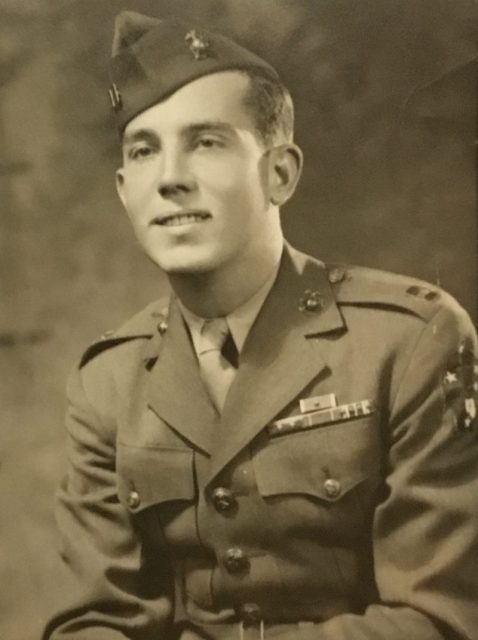
Destined to be the first contested amphibious landing of the war for the Marine Corps, Tarawa would be the first real test of their island hopping concept. For the better part of two years, the Japanese had constructed a veritable fortress within the island, and now maintained a 4,500-man defense.
So confident were they in their preparations, the commander boasted “it would take one million men 100 years” to take the island.
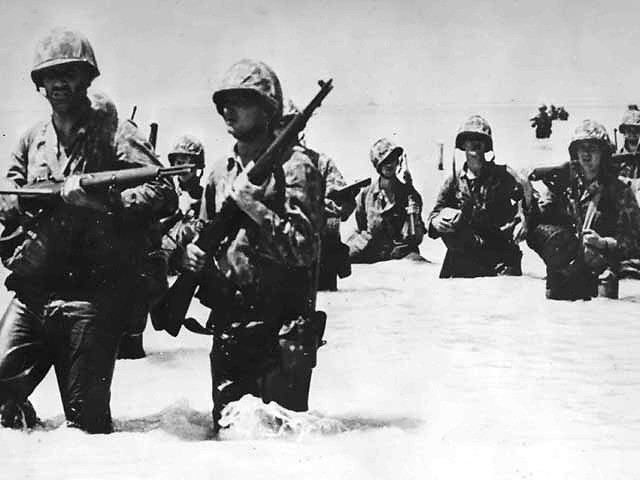
“We thought they’d just be wiped out by our Naval gun fire,” said Ladd, recalling that momentous day in 1943.
Leaping from the ramp, his orders “don’t stop for anybody who’s wounded, just get yourself in there,” rang in his ears as he dropped into the unknown of the blue waters before him.
A miscalculation of the tide left the Marines exposed, strung out 600 yards on the coral reef surrounding the island. With the shoreline nearly obscured by smoke, Ladd struggled forward through the waist high water, bullets kicking up mini geysers on all sides of him.
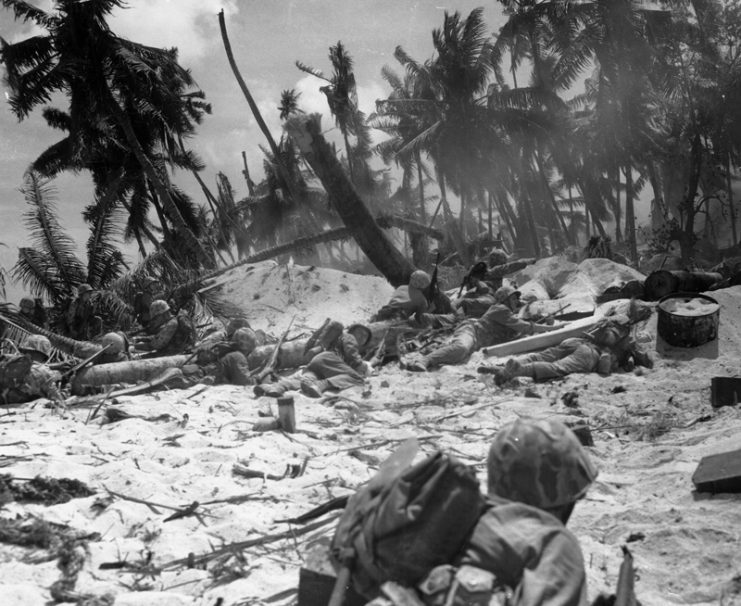
“Naturally, I thought I was done for,” said Ladd, remembering his thoughts, after being wounded.
To his shock, his men disobeyed their direct order by halting their advance to render him aid.
“Go on,” he protested weakly, but they refused. Working together, his men moved him to one of the landing craft ferrying wounded to the hospital ships anchored offshore.
As they approached, Ladd noticed a husky Marine standing next to the boat, his face grotesquely shredded on one side, waiting to be helped over the ramp now lowered three-fourths of the way to protect against incoming Japanese fire.
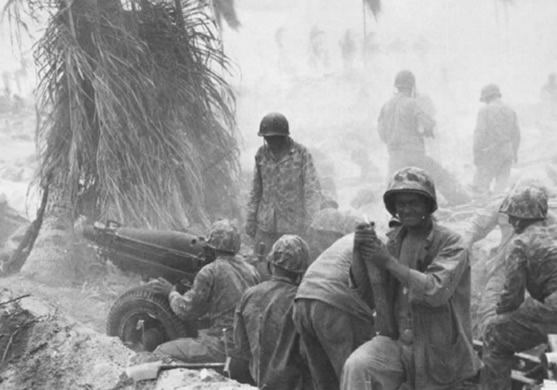
Ladd motioned for him to board first, and he was promptly boosted over the top.
Next, Ladd’s men began to lift his soaked body over the ramp, struggling under his dead weight and nearly faltering. In an instant, an arm reached over, grabbing Ladd by the shirt and pulling him into the relative safety of the craft. As he tumbled down to the deck, he was shocked to find his helper to be the man with the wounded face.
They rushed the men to the USS Sheridan, sitting off shore.
As they were being raised to the ship’s deck, Ladd said, “We made it,” to his unknown helper, lying next to him.
“You made it,” replied the Marine.
Ladd was rushed to emergency surgery where, in a twist of fate, a former Mayo Clinic surgeon that specialized in abdominal injuries saved his life.
The island, thought to take 100 years to fall, was tumbled by the Marines in just 76 hours. The cost for both sides was enormous, with the Marines suffering nearly 3,000 casualties.
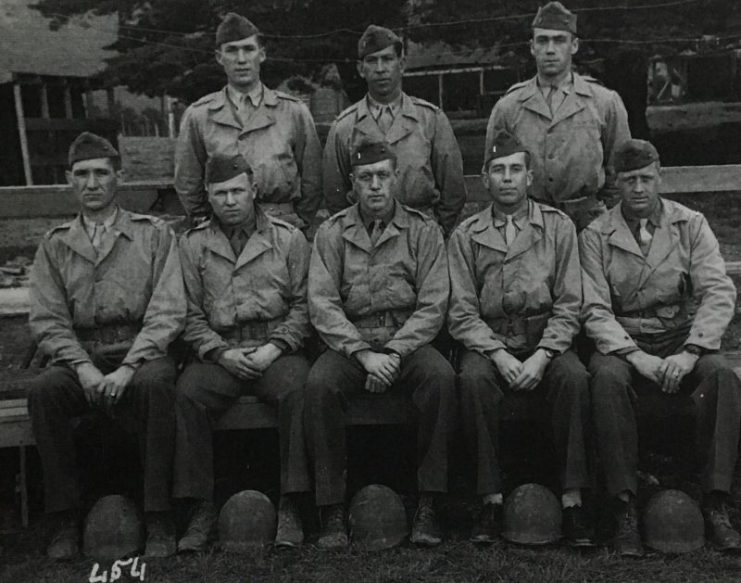
For the Japanese, only 17 survived.
Through ship logs nearly 50 years later, Ladd would learn the name of the Marine with the face wound. Twenty-one year old Sergeant James Maples of Ada, Oklahoma, was buried at sea later that day, leaving behind a young wife and a daughter he never had the opportunity to meet.
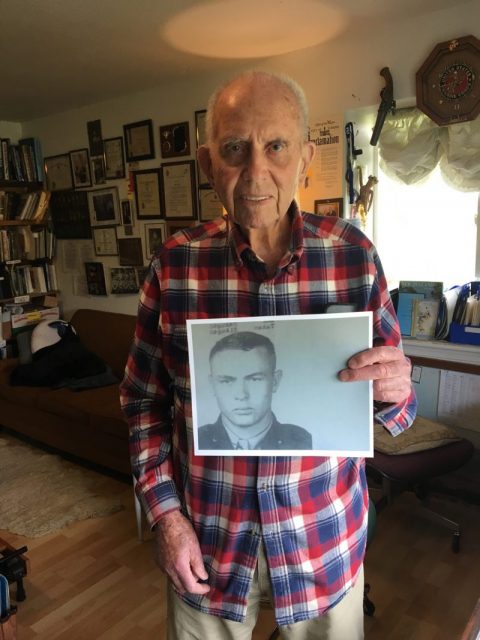
Seventy-four years on, an image of Maples has been discovered.
Standing in the doorway of his Spokane home, the now 98-year-old Ladd peered down at the black and white image, reunited with a brother.
Read another story from us: MIA Marines at Battle of Tarawa Found, Returned Home after Over 70 Years
Today we wonder, what could compel a man to harness his last bit of strength in the aid of a stranger?
I’ve come to the conclusion that it’s a special pride woven into the fabric of the Marines, embodied by their motto, Semper Fidelis: always faithful.
